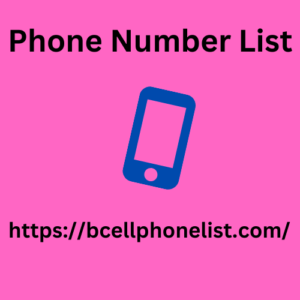- Relational Databases: Store data in structur tables with prefin schemas. Examples include Amazon RDS (Relational Database Service), Google Jordan Mobile Phone Numbers List Cloud SQL, and Azure SQL Database. and are ideal for transactional applications.
They use SQL for Jordan Mobile Phone Numbers List querying
- NoSQL Databases: Design for unstructur or semi-structur data. They include document stores, key-value stores, column-family stores, and graph databases. Examples are MongoDB Atlas, Amazon DynamoDB, and Google Cloud Bigtable.
Combine the scalability of NoSQL
- NewSQL Databases: with the consistency and transactional features of traditional SQL databases. Examples include Google Cloud Spanner and CockroachDB.
-
Data Security and Compliance
- Encryption: Cloud databases often provide encryption for data at rest and in Jordan Mobile Phone Numbers Database transit, ensuring that data is protect from unauthoriz access.
- Access Controls: Role-bas access controls and authentication mechanisms are us to manage who can access and modify data.
- Compliance: Cloud database providers typically adhere to industry standards and regulations (e.g., GDPR, HIPAA) to ensure that data handling meets legal and regulatory requirements.
-
Backup and Recovery
- Automat Backups: Cloud databases often include automat backup services that regularly create copies of data to safeguard against loss or corruption.
- Disaster Recovery: Many cloud databases offer disaster recovery solutions to quickly restore data and applications in case of major failures or outages.
-
Performance and Availability
- High Availability: Cloud databases are design to be highly available, with features such as automatic failover, replication, and multi-region deployments to minimize downtime.
- Performance Optimization: Providers offer various performance optimization features, including caching, indexing, and load balancing to enhance query spes and overall performance.
-
Cost Management
- Pay-as-You-Go: Most cloud databases use a pay-as-you-go pricing model, where users pay bas on the resources they consume. This model provides cost flexibility and allows organizations to only pay for what they use.
- Reserv Instances: Some cloud providers offer options to reserve capacity for a set period, often at a discount rate compar to on-demand pricing.
Benefits of Cloud Databases
- Cost Efficiency: Ruces the ne for physical hardware and infrastructure
- Knowing this information is management, lowering overall costs.
- Flexibility and Accessibility: Provides Access to Data from Anywhere with an Internet . Connection. Enabling Remote Work and Collaboration.
Ruc Maintenance: . Offloads . Database Management Tasks. Such as . Patching and Updates, to the Cloud Provider. Allowing Internal It Teams to Focus on Other Priorities.
Innovation: . Enables Rapid . Deployment of New .Applications and . Features .Byleveraging the Latest Cloud Technologies and Integrations.Cloud Databases . Represent a Modern Approach to. Data Managemen. Offering Scalability. Flexibility, and Cost-Effectiveness .While Rucing the Administrative Burden Associat with Traditional On-Premises Solutions.



